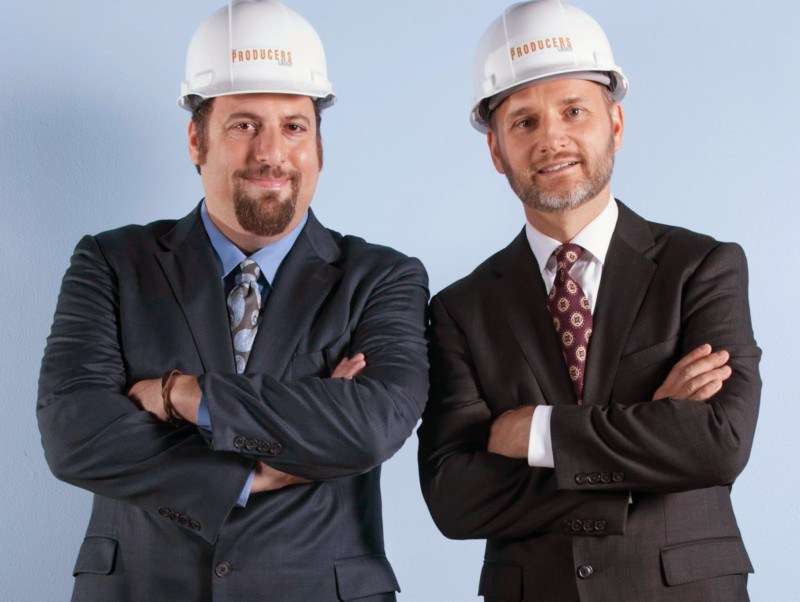The story of an increasingly global company in an increasingly global market
by Judith Rubin
The Producers Group LLC (TPG) has maintained a steady and growing stream of work, internationally, since co-CEOs Bob Chambers and Edward Marks formalized the company in 2011. At this writing, TPG has many projects in development on several continents, but none at the announcement stage. The company is headquartered in Los Angeles, with offices in Shanghai and Dubai, approximately 50 employees and a growing suite of services. The success and growth of TPG suggest that it is well aligned with the globalization and diversity of today’s attractions industry. We delved into the company culture and markets to understand more about what informs the TPG approach to doing business around the world, particularly in China and the UAE.
While Asia learns from the West, the West learns from Asia – Tom Mehrmann, TPG Advisory Board
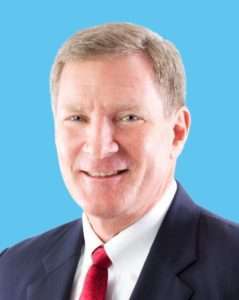
TPG company structure includes an active advisory board populated with industry innovators and leaders. A recent addition to this board is Tom Mehrmann, probably best known as the former CEO of Ocean Park Hong Kong. Mehrmann has lived and worked in the industry in Asia and Southeast Asia for 13 years. Since leaving Ocean Park last August, he has become partner in a new company, Lan Kwai Fong Attractions Ltd., to support developers, investors and operators of visitor attractions. One of their clients is Universal Studios.
When TPG holds a board meeting, Mehrmann participates to offer insights and advice. He also helps the company identify opportunities in Asia. “My business is providing themed attraction advice – how to set a project up and how to lead it to be successful from the start. I help with strategy, vision statement, mission statement, core values, differential values and guiding principles.
“Many Asian developers are reacting to eye candy,” he said. “They want something big, bold and different – that’s the ‘what’ and the ‘how’ of a project; I’m more about the ‘why.’” Currently, he said, “70% of parks in China are losing money, 20% are breaking even and only 10% are making money. For true success, you must ask more than logistical questions. Does the project align with core values? Will it drive business and attendance? A culturally entrepreneurial developer with a dream may not be thinking about markets and infrastructure, much less standards, safety, health and welfare. They may build the wrong product for the market. There are some pretty colossal failures out there, but there are some great successes as well.”
Where a company like TPG comes into play, according to Mehrmann, is connecting the “hardware” of a project – the physical components and systems – with the “software” – meaning the people required to install, program, troubleshoot, maintain and upgrade. “The best equipment in the world will only be good for so long if you don’t know how to run, operate or fix it. TPG are master problem solvers,” he said. “They will step into projects, discover what’s missing and get them back on track and completed. They can interface the creative with the nuts and bolts. They’re selling the intangibles of production – what happens between design and construction.”
Mehrmann acknowledges concerns about protecting Western IP and expertise to preserve the value of Western companies in the industry. But – “If you are too protection oriented, you will end up missing work and opportunity. We are watching an industry emerge. We are not yet seeing in China the capability to interface truly dynamic ideas into the hardware. We will see groups like TPG for a long time. The key thing, for Westerners trying to penetrate the market, is to form partnerships – find trustworthy partners who can help represent them, be with them on sites and with whom they have established a relationship. The best projects I have seen in Asia were the result of good partnerships.” He acknowledges that it is happening quickly: “The mere fact of some home developers having emerged as dominant attendance drivers and with aspirations to lead the world, and having the financing and markets available, means we are watching a learning curve that is much steeper than what happened when this industry grew up in the West. If China doesn’t have it today, they will get it very quickly. And while Asia is learning from the West, the West is learning from Asia.”
People knew where Mars was, but not Dubai – Sumaira Isaacs, director of international relations, TPG
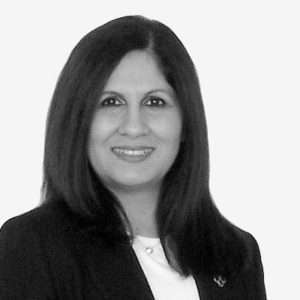
In January, Sumaira Isaacs joined TPG’s Dubai office, bringing her 25+ years’ experience in regional tourism development, including Dubai and the UAE, Saudi Arabia, India, Qatar, Turkey and South Africa. Originally from Pakistan, she makes her home in Dubai and Toronto. “The Emirates, travel and tourism are in my blood,” she said.
The UAE region depends heavily on tourism for visitation, but is well located to achieve this, and no one knows it better than Isaacs, who said, “All the tourism is international, but we are right in the middle, with nearly two billion people within a short radius. And Dubai is a business hub and central shipping point. All the trade partners represent tourism markets. We’re looking at opportunities from South Africa to Ethiopia.”
Isaacs, who since January has already traveled a great deal with Bob Chambers, exhibits huge enthusiasm for her new role in the region she knows so well; likewise for who and what she represents in TPG. “I am really enjoying learning about theme parks and attractions. It’s a fun business, and Bob’s enthusiasm is infectious. I wouldn’t have touched this product at all if I didn’t believe in it. TPG is a lean and mean company, and I like that: It is what my previous outfit was like, you ramp up the teams as the job requires.”
She finds that the culture of doing business in the Middle East has some similarities to China. “There have to be certain relationships in place, and they are in the same kind of hurry. They love American culture. In the MidEast, however, business may be done over a handshake; not so in China.” Language is sometimes a barrier; but English is a common business language, and Isaacs is fluent in English and Urdu, and reads and writes Arabic as well. “We work with relationships, we pay attention to simple things, cultural details here and there, from boardroom sensitivities to how you word a proposal. It’s a pleasure to do it for TPG because they are thoroughly professional.”
Isaacs has also had experience in relation to world’s fairs, which is especially relevant as Dubai prepares to host Expo 2020, a six-month BIE-Registered expo. “I was honored to be part of a delegation of top organizations, sponsored and invited by Dubai EXPO, to visit the Milan Expo 2015 as an observer,” she said. “MCI Brussels had the job of designing, managing and installation of the EU Pavilion, and at that point, I was representing MCI as Regional COO Middle East, Africa and India.”
Developers in these regions tend to be more experienced with retail and hospitality than they are with entertainment, but recent theme park openings in Dubai are changing perceptions quickly, according to Isaacs. “These countries are waking up to the fact that they need something more,” she said. She points out that when she began her career in tourism, Dubai was a little-known destination with few accommodations. “People knew where Mars was, but not Dubai,” she said. “I always say I am in the business of fighting perceptions and educating. We are now educating the destinations about a product. We know from experience that theme parks are a unique kind of investment. To ensure you have healthy occupancy takes time. You can only fast-track it so much. Some developers think a theme park can only happen successfully in America or China – we are showing them that it’s possible in their region, too.”
“We never close” Edward Marks and Bob Chambers, TPG Co-CEOs
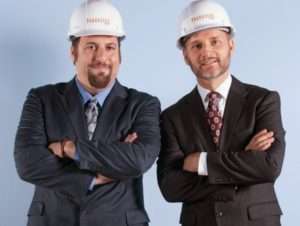
How has the themed entertainment landscape changed now that Shanghai Disney Resort has opened in China, and Dubai Parks & Resorts has opened in the UAE? “Raising the bar” (for quality and, therefore, budgets) is perhaps the simplest way to define it. There is reportedly a deeper awareness of what’s needed to make such a project succeed.
“We are definitely in a post-Shanghai Disneyland world,” said Edward Marks. “Operators are stepping up their game now they see what their real competition is. We see a desire for better work, better technology. Budgets aren’t totally following suit yet, but that takes time.”
Certainly, it’s an environment that affords plenty of work for TPG, including four major projects in China. One of them is for the Evergrand Group, a new theme park on Hainan Island – Ocean Flower Park, for which TPG is producing three shows.
There have been other, related milestones for TPG. In November 2016, the company announced its first turnkey product via a new partnership with Premier Rides: Extraordinary Voyages Adventure Dining (EVAD), a themed dining experience. The first EVAD installations are expected to be announced sometime in the next 12 months. In July 2017 TPG will finish transitioning to its new Los Angeles office, nearly tripling the size of TPG headquarters and with the ability to enhance its main offerings – production, technical integration and consulting – with creative services such as show set design, art direction, storyboarding, CAD and media, when clients need them.
For entertainment markets still on the road to maturity, one-stop shopping is often cited as the best way to ensure a continuity that streamlines the project process and preserves authenticity of vision. According to Edward Marks: “In China, companies with all services available under one roof are really what the market needs at its current stage. The successful firm is going to be a design-build firm – and the most successful developers will turn to those kinds of firms. That is, in fact, what we are now seeing.”
This is in line with the producer-driven model of TPG. “As producers, TPG has one foot soundly in creative and one in technical,” said Marks, who trained as a lighting designer. “We creatively get the story; we get the vision while understanding how to achieve both. We focus on both – always. It’s our mantra and our constant communication on every team.”
“Shanghai Disney works because they spent both time and money on it,” said Bob Chambers. “If it were just money – or if it were just a lot of time on design – it wouldn’t have worked. The example of Shanghai Disneyland – in comparison to examples of unsuccessful projects that have happened in the past 10 years or so – is helping Asian developers turn into more sophisticated, knowledgeable buyers, who are learning how to vet vendors, slice bids and projects differently, understand risks, and get a much better product. Ultimately, turnkey or design-build per se isn’t the solution: understanding the process is the solution.”
Chambers and Marks echo Mehrmann in emphasizing that the learning goes both ways between East and West. “Luckily for our company, we had early success in Asia,” said Marks. “A lot of the Western firms that flooded Asia as the entertainment industry began to boom learned the hard way that you can’t change China. You can’t just say, ‘this is how you create a theme park.’ You don’t change it, it changes you. It is a process. You have to take cultural factors into account. That said, we have found, the more countries we work in, that we’re all more alike than not.”
Increasingly, TPG is a company that belongs to all regions and time zones. “There is stability all over the world in many different regions, including countries that many might consider unstable. Take a closer look. Go there and meet them,” said Marks. “We said we would put this company on every continent. We’re truly a company that functions in a dozen time zones at once. We’re never closed. With the possible exception of a tiny window where the weekends overlap, at any given time there is somebody working on regular payroll hours somewhere on the planet for TPG.” • • •
To set up an appointment with The Producers Group during AAE Singapore, or for general inquiries, email [email protected].
The Producers Group – business milestones
• 2011 – TPG established in Los Angeles
• 2012 – TPG appointed owner’s rep on reboot of Lights of Liberty (Philadelphia, USA)
• 2013 – TPG engaged on Chimelong Ocean Kingdom, Zhuhai China
• 2014 – TPG adds second office in Shanghai
• 2015 – TPG expands to three offices, adding Dubai; engaged on Shanghai Disneyland attractions.
• 2016 – Successful opening of TPG attractions: Cobra’s Curse (Busch Gardens Tampa); Dabangg Live Action Stunt Show; Step Up – All In Live Musical Dance Show (Dubai Parks & Resorts)
• 2016 – TPG launches Extraordinary Voyages Adventure Dining (EVAD) with Premier Rides
• 2017 – Tom Mehrmann joins TPG board. TPG celebrating six years in business.
The Producers Group – international contacts

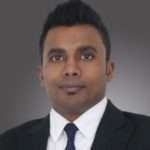

TPG Dubai office
• Sumaira Isaacs, Director of International Relations, [email protected]
• Ammar Hussain, Business Development Director MENA Region, [email protected]
TPG Shanghai office
• Praveen Rao, Regional Manager, [email protected]
• Flora Duan, Business Development Manager, [email protected]


